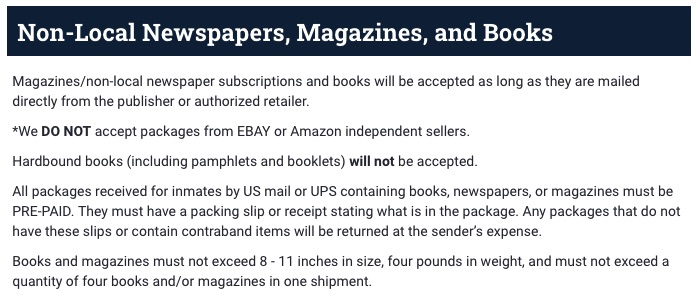Georgia Independent Bookstore Sues Jail Over Policy Banning Book Shipments
Officials claim the policy is intended to prevent people from smuggling in contraband, but it allows shipments from Amazon and Barnes & Noble.

A Georgia jail is refusing all books shipped to inmates, except those that come from major retailers. One local bookshop is suing, saying that policy is unconstitutional.
In May 2023, two different people visited Avid Bookshop, a progressive independent bookstore located in Athens, Georgia. Each customer purchased three books to mail to an inmate at the Gwinnett County Jail. Both packages were returned, with papers from the jail listing the reason as "Not from publisher/authorized Retailer." The shoppers asked Avid if the store could mail the books directly.
Each time, Luis Correa, Avid's operations manager, packaged new paperback copies of the same books and mailed them directly from the store. Aware of the jail's stated policy that shipments "must have a packing slip or receipt stating what is in the package," Correa included both. (Correa declined to be interviewed for this article.)
Again, the packages came back, with a sticker saying they were "not sent from publisher or authorized retailer."
Gwinnett County's website states that "magazines/non-local newspaper subscriptions and books will be accepted as long as they are mailed directly from the publisher or authorized retailer," but it gives no clarification on what an authorized retailer is or how to become one.

Correa contacted the jail to ask why it was rejecting Avid's shipments. The lawsuit claims a deputy then advised that "because Avid was a local bookstore, friends and relatives could enter the bookstore and place contraband inside the books that were sent to the Jail." The deputy further noted that the jail only accepts packages from Amazon and Barnes & Noble but added that "even Barnes & Noble, we've been having problems with them."
That's blatantly unconstitutional, says Atlanta civil rights attorney Zack Greenamyre. "Avid exists to be able to communicate through books with other people," Greenamyre tells Reason. "That certainly includes people who are in custody, perhaps especially. And the government is telling them they can't engage in their expressive conduct, for no good reason."
Avid pressed the issue, seeking to appeal the "authorized retailer" policy. In an emailed reply, Dan Mayfield, general counsel for the Gwinnett County Sheriff's Office—which runs the jail—said that the policy was in place "to ensure that associates of the residents cannot soak pages in drugs or otherwise create safety issues. We cannot approve bookstores, like Avid, that are open to the public."
Texas prison officials allege that inmates receive shipments of paper that has been soaked in drugs like fentanyl or synthetic THC. Testifying before the New York City Council in October 2022, NYC Department of Correction Commissioner Louis Molina explained how fentanyl gets into the city's jails: "Most of it enters in letters and packages laced with fentanyl, literally soaked in the drug, and mailed to people in custody," at which point inmates "smoke it or chew it or snort it off the paper."
"Are Texas officials suggesting the pages of the books are saturated with THC and the inmates tear out the pages and lick them or ingest them?" wonders Jeffrey Singer, a practicing physician and senior fellow at the Cato Institute. "I have never heard of anyone doing that, and I am not sure how effective it would be." He tells Reason that inmates could theoretically use THC-infused paper to "roll loose tobacco cigarettes and give them a kick," but "the prison can forbid prisoners from using rolling tobacco."
"Snorting [fentanyl] off the paper would be more challenging since it is presumably embedded in the paper, not powder-like, and useful for snorting," Singer adds. "I don't know if any of these things have ever occurred, or whether law enforcement is simply imagining such scenarios."
It's also worth noting that most contraband in Texas prisons was brought in by staff. In December, a federal grand jury indicted 13 defendants for smuggling narcotics into Texas prisons, including three correctional officers.
Avid is suing the Gwinnett County sheriff and the commander of the jail, seeking "a declaratory judgment that the Gwinnett County Jail's Authorized Retailer Policy violates the First and Fourteenth Amendments" in addition to "nominal and compensatory damages." Greenamyre is representing Avid in its lawsuit.
The lawsuit, filed in March, says the "authorized retailer" policy is "not reasonably related to a legitimate penological interest," as is the distinction to allow Amazon or Barnes & Noble to ship books to the jail but not a smaller bookstore. "Avid can mail new books to Jail residents" from its own warehouse "without any member of the public having had access to the books," just as Amazon would, the lawsuit says.
The suit further claims that in response to an open records request, the county did not "produce any documents relating to incidents of contraband being found inside books mailed to the Gwinnett County Jail."
Unfortunately, censorship by jail and prison authorities is nothing new: As Reason's C.J. Ciaramella wrote in 2018, "State prison systems ban thousands upon thousands of books." Texas, for example, had banned 10,000 individual titles.
According to a database published by The Marshall Project, Georgia prisons have banned 28 specific book titles. The banned list ranges from theoretically reasonable inclusions, like Hacking for Dummies or The Big Book of Serial Killers, to the bizarre, like The Mammoth Book of Vampire Romance 2 or the Fifty Shades of Grey series. Georgia prisons have also banned the Quran, which similarly seems like a violation of the First Amendment.
And Reason has experienced its own share of prison censorship: Most recently, a subscriber incarcerated in FMC Devens, a Massachusetts federal prison, was blocked from receiving the magazine's October 2023 issue. That issue's cover story detailed how federal correctional officers were not prosecuted even after admitting to sexually assaulting inmates at the Florida women's prison where they worked.
According to a rejection letter from FMC Devens, "Such material jeopardizes the good order and security of the institution."



Show Comments (13)